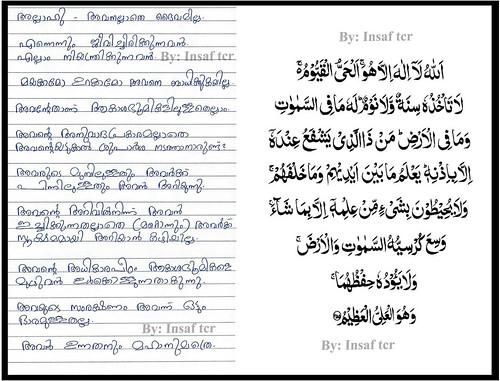Ayatul kursi transliteration pdf Download Link ayatul kursi transliteration pdf Download Here - Copy the link and open in a new browser window - Ayatul Kursi is verse 255 of the second chapter, surah Baqarah of the Holy Quran, Surah al-Baqarah (The Chapter of the Cow). Kursi (Verse 255 of Surah Al-Baqarah) completely, for there is still upon you from Allah a guardian, and no shaytan can get close to you until you enter upon morning.’ Then he (peace and blessings be upon him) said: “He told you the truth and he is a liar, (that was a shaitan).” Sahih Al-Bukhari 10. Ayatul kursi malayalam translation pdf file. Rsymedia.com is Media search engine and does not host any files, No media files are indexed hosted cached or stored on our server, They are located on soundcloud and Youtube, We only help you to search the link source to the other server.
Ayatul Kursi - Translation, Transliteration, and Arabic Text Ayatul Kursi: Ayatul Kursi is the Verse of Surah Al-Baqarah. The largest Surah of Quran Majeed is Surah Al-Baqarah. In addition, t he verse number 255 of Surah Al-Baqarah is Ayat-al-Kursi. Indeed, Ayatul Kursi is the leader of this leader Surah of the Holy Quran.
Recitation of Ayatul Kursi Results in the Focus of Allah (swt) upon His Servants
2:255
Ayatul Kursi Malayalam Translation Pdf Online


2:256
Ayatul Kursi Malayalam Translation Pdf
2:257
The Throne Verse (Arabic: آيَة الْكُرْسِي, romanized: ʾāyat al-kursī) is the 255th verse of the 2nd surah of the Quran, Al-Baqarah (Q2:255). The verse speaks about how nothing and nobody is regarded to be comparable to God.[1][2]
This is one of the best-known verses of the Quran and is widely memorised and displayed in the Muslim world.[3] It is often recited as a practice of apotropaic magic to ward off jinn.[4]
Text and meaning[edit]
The Throne Verse consists of ten sentences.[5]
| Arabic[a] | Transliteration | English[b] |
|---|---|---|
| اللَّهُ لاَ إِلَهَ إِلاَّ هُو ج | Allāhu lā ilāha illā hūwa | Allah! There is no god but He, |
| ٱلْحَىُّ ٱلْقَيُّوم ج | Al ḥayyu l-qayyūm | the Living, the Self-subsisting, Eternal . |
| لَا تَأْخُذُهُۥ سِنَةٌ وَلَا نَوْم ج | Lā ta’khudhuhū sinatun walā nawm | No slumber can seize Him nor sleep. |
| لَهُ مَا فِي السَّمَاوَاتِ وَمَا فِي الأَرْضِ قلے | Lahū mā fi s-samāwāti wamā fi l-’arḍ | His are all things in the heavens and on earth. |
| مَن ذَا ٱلَّذِى يَشْفَعُ عِندَهُۥٓ إِلَّا بِإِذْنِهِۦ ج | Man dha l-ladhī yashfa‘u ‘indahū ’illā bi’idhnih | Who is there can intercede in His presence except as He permitteth? |
| يَعْلَمُ مَا بَيْنَ أَيْدِيهِمْ وَمَا خَلْفَهُم صلے | Ya‘lamu mā bayna ’aydīhim wamā khalfahum | He knoweth what (appeareth to His creatures as) before or after or behind them. |
| وَلَا يُحِيطُونَ بِشَىْءٍ مِّنْ عِلْمِهِۦٓ إِلَّا بِمَا شَآء ج | walā yuḥītūna bishay’in min ‘ilmihī ’illā bimā shā’ | Nor shall they compass aught of His knowledge except as He willeth. |
| وَسِعَ كُرْسِيُّهُ ٱلسَّمَٰوَٰتِ وَٱلْأَرْض صلے | Wasi‘a kursiyuhu s-samāwāti wal’arḍ | His Throne doth extend over the heavens and the earth, |
| وَلَا يَـُٔودُهُۥ حِفْظُهُمَا ج | Walā ya’ūduhū ḥifẓuhumā | and He feeleth no fatigue in guarding and preserving them |
| وَهُوَ ٱلْعَلِىُّ ٱلْعَظِيمُ | Wahuwa l-‘aliyyu l-‘aẓīm | for He is the Most High, the Supreme (in glory). |
Traditions[edit]
Ayat al-Kursi is regarded as the greatest verse of Quran according to hadith.[6][7] The verse is regarded as one of the most powerful in the Quran because when it is recited, the greatness of God is believed to be confirmed. The person who recites this ayah morning and evening will be under protection of God from the evil of the jinn and the shayatin (demons); this is also known as the daily adkhar. It is used in exorcism, to cure and protect from jinn and shayatin.[8] Because the Throne Verse is believed to grant spiritual or physical protection, it is often recited by Muslims before setting out on a journey and before going to sleep.[9][3][6]The verse is also used for safety and survival from khabis jinns for all the day.[10] Reciting the verse after every prayer is believed to grant entry to paradise.[11][12]
See also[edit]
Notes[edit]
- ^Hafs from Aasim ibn Abi al-Najud
- ^Quran2:255(Translated by Yusuf Ali)
References[edit]
- ^Abdullah Yusuf Ali (1983) [First published 1934]. The Holy Qur'ān: Text, Translation and Commentary. Brentwood, Maryland: Amana Corp. pp. 102–103.
- ^'Surah Al-Baqarah - 2:255'. quran.com. Retrieved 16 October 2020.
- ^ abSeyyed Hossein Nasr, ed. (2018). The Study Quran. HarperCollins Publishers. p. 110.
- ^Afzal, Sagheer. (2011). The Reluctant Mullah. London: Halban. ISBN978-1-905559-27-5. OCLC782868200.
- ^Tafsīr ibn Kathīr, al-Baqarah, tafsir verse 255 (Ayatul Kursi)
- ^ abEphrat, Daphna; Wolper, Ethel Sara; Pinto, Paolo G. (2021). Saintly Spheres and Islamic Landscapes: Emplacements of Spiritual Power across Time and Place (Volume 147 ed.). Brill publishers. p. 290. ISBN978-90-04-44427-0. Retrieved 9 January 2021.
- ^DAWUD, ABU (January 2008). 'Abu Dawood 1460'. The third correct tradition of the Prophetic Sunna (Sunan Abu Dawud) 1-5 VOL 2: سنن ابي داود 1/5 [انكليزي/عربي] ج2. Dar Al Kotob Al Ilmiyah دار الكتب العلمية. p. 152. Retrieved 9 January 2021.
- ^'Quran Tafsir Ibn Kathir - the Virtue of Ayat Al-Kursi'.
- ^Sahih al-Bukhari 2311
- ^Sahihut Targhib: 1/418
- ^Nasai Kubra 9926, Tabarani 6532, Sahihul Jame 8484
- ^Wherry, E. M. (1882). A Comprehensive Commentary on the Qurán: Comprising Sale's Translation & Preliminary Discourse, with Additional Notes & Emendations. Together with a Complete Index to the Text, Preliminary Discourse, & Notes, by the Rev. E.M. Wherry... (Volume 1 ed.). Camridge, New York: R.S. Publishing House. p. 383. Retrieved 9 January 2021.